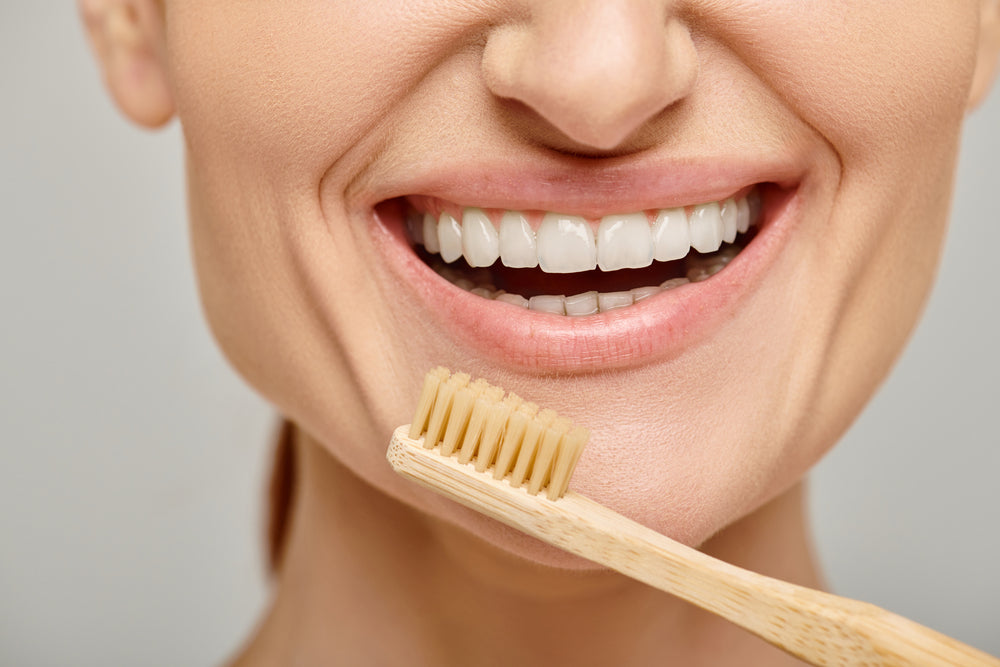
What Causes Tooth Enamel Erosion and Damage?
|
Time to read 5 min
|
Time to read 5 min
Tooth enamel erosion is a common dental issue that occurs when the protective layer of enamel on our teeth gradually wears away. Acid found within food and drinks plays a crucial role in this process as it erodes the enamel over time, leaving the teeth vulnerable to various dental problems . While food and drinks are the obvious culprits behind tooth enamel loss, there are several other factors that can contribute to high acid production and exacerbate the erosion process. This article delves into the different causes of tooth enamel erosion and what can happen if your enamel breaks down.
While enamel is incredibly strong, it is not very durable and can be damaged or broken due to a variety of factors, including:
Dietary Habits:
Frequent consumption of acidic foods and beverages can significantly contribute to tooth enamel erosion. Acidic substances, such as citrus fruits, carbonated drinks, sports drinks, and vinegary foods introduce acids into the mouth, which gradually damage the enamel.
Also of importance is the consumption of sugar. This is not limited to candies and cakes as even so-called healthy items, such as fruit juices, contain high levels of sugar. Also, simple carbohydrates convert to sugars. The underlying problem is that these sugars feed unhealthy bacteria which then create acid byproducts and other damaging byproducts (such as plaque) that contribute to enamel erosion and destruction.
Oral Microbiome Imbalances:
This is a vast subject and can only be lightly touched upon here. In simple terms, your oral cavity contains hundreds of types of micro-life, such as bacteria, that serve vital purposes and carry out important functions in a healthy, balanced mouth. However, the modern diet along with chemicals, medications and anti-bacterial products disrupt the bacterial balance. Certain bacteria grow out of control and create biological byproducts (such as acids) that are very detrimental to the health of your enamel, gums and even your overall health.
Dry Mouth:
Having a dry mouth, also known as xerostomia, can increase the risk of tooth enamel erosion. Saliva plays a crucial role in neutralizing acids and maintaining a healthy pH balance in the mouth. However, individuals with dry mouth do not produce enough saliva, leading to a pH imbalance and allowing acids to attack the enamel more easily.
Inadequate salivary flow, also known as hyposalivation, can be caused by various factors such as certain medical conditions, medications, or radiation therapy. Saliva helps neutralize acids and remineralize the enamel, so a reduced salivary flow can leave the teeth vulnerable to acid attacks and accelerate enamel erosion.
Acid Reflux:
Gastroesophageal reflux disease (GERD) or frequent acid reflux can have damaging effects on tooth enamel. Acid reflux causes stomach acid to flow back into the mouth, exposing the teeth to acid on a regular basis. The repeated contact between the acid and enamel can gradually wear it down, resulting in erosion over time.
GI Tract Issues:
Certain gastrointestinal conditions, such as bulimia or frequent vomiting due to other medical reasons, introduce stomach acid into the mouth. The highly acidic nature of stomach acid can cause severe erosion of tooth enamel when it comes into contact with the teeth repeatedly.
Medications:
Some medications, including aspirin and antihistamines, can contribute to tooth enamel erosion. These medications, especially when taken frequently or in large doses, have acidic properties that can directly damage the enamel. It is important to consult with a healthcare professional or dentist about the potential side effects of medications and take necessary precautions to protect the teeth.
Genetics:
Genetics can also play a role in tooth enamel erosion. Some individuals may naturally have thinner enamel or be more prone to dental issues, including erosion. If there is a family history of tooth enamel problems, it is important to take extra precautions to protect the enamel through proper oral hygiene and using Dentist Formulated Fluoride Free Remineralizing Toothpaste With Nano Hydroxyapatite for Enamel Repair and Sensitive Teeth in the Peppermint Wow Flavor .
Bruxism:
Bruxism, the habit of grinding or clenching the teeth, can contribute to tooth enamel erosion. The constant pressure exerted on the teeth during grinding can wear down the enamel over time, making it more susceptible to acid attacks and erosion.
Discover More: Can You Rebuild Your Enamel and Dentin?
Effective bad breath remedies include:
Gentle and regular scraping of the tongue
Regular oral care practices such as daily brushing and flossing
Professional deep cleanings and plaque removal
The ongoing use of oral probiotics.
One, the probiotics compete with the existing bad bacteria and reduce their presence by “crowding them out”
Two, the probiotics produce BLIS or “bacteriocin-like-inhibitory-substances” which is a technical way of stating that one probiotic strain (bacteria) can produce a substance that inhibits or kills off other bacteria. Three, by working to control gingivitis, gum disease and tooth decay these probiotics reduce the very sources of bacteria-generated odors in the mouth.
Studies have shown a clear reduction in plaque levels and gingivitis symptoms when oral probiotics were administered to patients with moderate to severe gingivitis.


